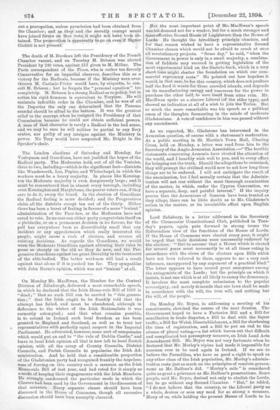But the most important point of Mr. MacEwan's speech was
his demand not for a weaker, but for a much stronger and more effective Second House of Legislature than the House of Lords. He thought the hereditary principle obsolete, and for that reason wished to have a representative Second Chamber chosen which would not be afraid to crush at once all revolutionary projects. "Some day," he said, "when the Government in power is only in a small majority, a combina- tion of faddists may succeed in getting legislation of the most experimental kind on the Statute-book, which in a very short time might shatter the foundation on which our com- mercial supremacy rests." He pointed out bow hopeless it would, in that case, be for this country, which does not produce half the food it wants for these crowded islands, and depends on its manufacturing energy and resources for the power to purchase the other half, to save itself from utter ruin. Mr. MacEwan spoke as a sincere Liberal (of the older type), and showed no indication at all of a wish to join the Tories. But so much the more remarkable was his speech as a political omen of the thoughts fermenting in the minds of moderate, G la dstonians. A vote of confidence in him was passed without any amendment.

































 Previous page
Previous page